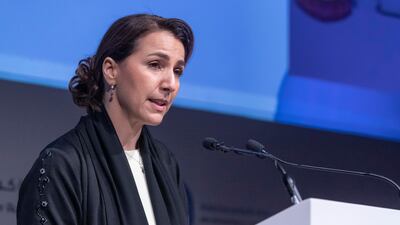The oil crisis has served as a "reality check" for many nations that believed they had made progress in transitioning away from fossil fuels, the UAE's environment minister said.
Mariam Al Mheiri, Minister of Climate Change and Environment and Minister of State for Food Security, said the path to net zero carbon emissions was a long journey that takes dedication and huge spending.
The minister spoke on the second day of the World Government Summit at Expo 2020 Dubai, and was asked by former CNN anchor John Defterios about the impact of the Ukraine war and the broader oil crisis.
"What we're experiencing right now, John, is as if we've switched off oil and gas," Ms Al Mheiri said of the sudden shortages caused by European nations suspending use of Russian gas.
"Countries are coming to us saying to 'produce more, do more because we're not ready yet'."
For most nations, she said, there was no alternative to continuing to use fossil fuels while renewables and nuclear were being ramped up.
____________________________________
UAE's energy future: in pictures
____________________________________
"Our systems are not ready yet," she said.
"And this is why I said we need to take this two-pronged approach. We need to ramp up our clean and renewables, decarbonise, and once it's ready we then switch and become less dependent on hydrocarbons.
"Our systems are not ready yet and what we are experiencing right now is the reality. It's a reality check for us."
Ms Al Mheiri, who will play a crucial role in the run-up to Abu Dhabi hosting Cop28 in 2023, said her government was clear about the challenges it would face on the road to becoming net zero by 2050.
"We have to ramp up clean and renewables and at the same time decarbonise our hydrocarbons and this, ladies and gentlemen, takes time and it takes money," she said.
"We know that because we are in this journey. Sixteen years ago it started here in the UAE."
With Egypt hosting Cop27 in November and Abu Dhabi Cop28 next year, the region has an opportunity to show the progress it has made.
"I said time and money: in 16 years we've invested about $40 billion in the UAE," the minister said.
"We've invested about $17 billion outside of the UAE in over 70 countries and today we're proud to say the UAE is operating three of the largest solar parks in the world, at the lowest cost.
"We have the nuclear plant that is up and running and once it's at full capacity it'll be covering 25 per cent of our energy needs.
"We also have the first industrial green hydrogen plant as well."
Ms Al Mheiri stressed that nuclear must be seen as a source of clean energy, when confronted with the realities of waning ourselves off oil.
Emirates Nuclear Energy Corporation
"We need to look at all solutions at hand and nuclear is one of them," she said.
Speaking on the same panel, Mohamed Al Hammadi, managing director and chief executive of Emirates Nuclear Energy Corporation (Enec), which operates Barakah nuclear power plant, said the energy decisions that countries make today will have a major bearing on tomorrow.
“Ultimately, nations need to take a realistic, technology agnostic approach to developing their energy portfolios to ensure we are able to meet the demands of the ever growing market for clean electricity," he said.
"By making the right choices today, we will not only be able to drive electrification, but decarbonisation too, ensuring both energy security and sustainability targets are met, as this provides the foundation for global prosperity."















